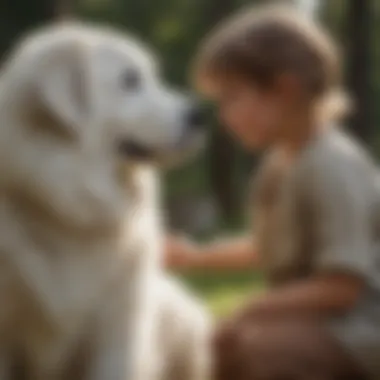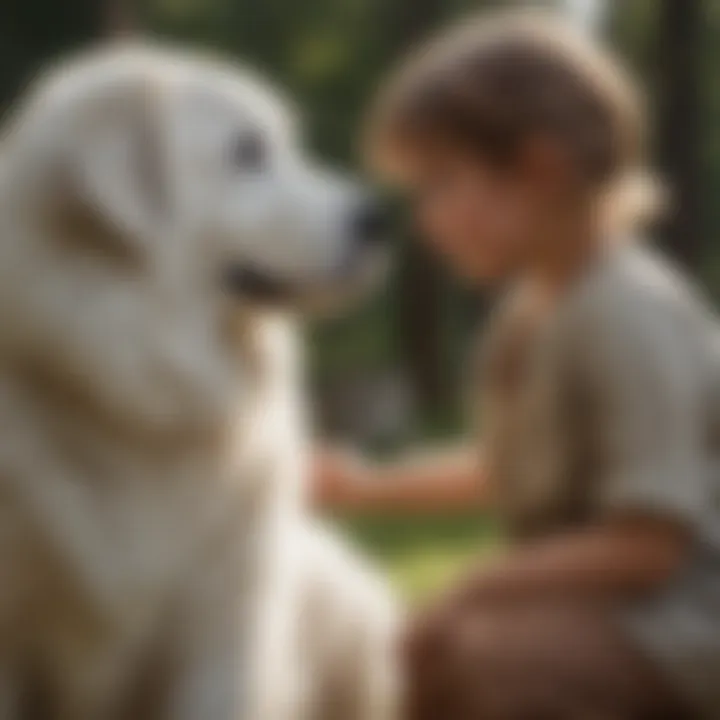Exploring the Distinct Traits of Great Pyrenees Dogs


Intro
The Great Pyrenees is more than just a pretty face. Known for their stunning white coats and calm demeanor, these dogs have a personality that sets them apart. But what exactly defines their essence? Why do they consistently capture the hearts of many? In this article, we venture into the unique traits that make the Great Pyrenees an esteemed canine companion and watchdog.
We will begin by painting a broad picture of this breed, followed by insights into their amazing history, temperament, and some practical care tips to ensure a happy, healthy life for your future Pyrenees.
Animal Profile
General Overview
Great Pyrenees are characterized by their gentle spirit and robust build. Originating from the mountainous regions of France and Spain, they were bred to guard livestock. Their instinct to protect, coupled with their affectionate nature, creates a dual purpose: they are both loyal companions and vigilant guardians.
The average weight of a Great Pyrenees ranges from 85 to 115 pounds, with females usually being lighter than the males. Their thick double coat, designed for cold climates, requires regular grooming to keep it in top condition. The breed's calm demeanor often translates into a patient, resilient, and attentive temperament, indicative of their heritage as protectors.
Habitat and Distribution
Great Pyrenees thrive in a variety of environments, ranging from open fields to wooded areas. Their original role as livestock guardians required them to patrol vast expanses, and they have adapted well to rural living. However, they can also be content in suburban settings, provided they have enough space to roam and play.
"Great Pyrenees are more than just guardians; they are companions who bring a unique blend of loyalty and gentleness, making them beloved members of any family."
Fascinating Facts
Unique Traits and Adaptations
Great Pyrenees are known for several standout traits that are worth noting:
- Independent thinkers: Their guard-dog instincts mean they often have a mind of their own, making decision-making a natural part of their behavior.
- Gentle giants: Despite their size, they possess a calm and gentle demeanor, being especially good with children.
- Night owls: Many Great Pyrenees are more active at night, making them great protectors as they tend to be vigilant when most are asleep.
Historical and Cultural Significance
Historically, Great Pyrenees were vital in European agriculture, providing protection against both wild animals and potential thieves. Their contributions have earned them a reputation in various cultures as stalwart guardians, and they continue to be admired for their balance of strength and grace.
Conservation Status
Current Population Trends
While the Great Pyrenees breed is not listed as endangered, interest in owning one has fluctuated. As people increasingly seek out large breeds for companionship and protection, their numbers have seen a slight uptick in recent years.
Threats and Challenges
The main challenges facing the Great Pyrenees breed involves health concerns due to their size, such as hip dysplasia and certain heart conditions. Responsible breeding practices are essential to maintain genetic health and minimize these risks.
Care Tips for Pet Owners
Basic Needs and Requirements
- Space: Great Pyrenees require ample room to move, ideally a moderate to large yard. Urban living in apartments may not suit them.
- Exercise: While they’re not overly energetic, daily walks and playtime help keep them mentally stimulated and happy.
- Diet: Feeding them a high-quality diet appropriate for their age and size will promote overall health.
Health and Wellness Tips
Regular veterinary check-ups, dental care, and grooming are essential for their well-being. As with all dogs, maintaining a healthy weight through proper diet and regular exercise is crucial, especially as they age. Stay vigilant for any signs of distress, such as limping or unusual behavior, to ensure prompt intervention if needed.
Prelims to the Great Pyrenees
The Great Pyrenees, often affectionately dubbed as "Pyrs," are dogs that embody grace and stoicism blended into one magnificent package. Understanding this breed requires a peek into their storied past, physical charm, and the potent personality traits that make them truly unique companions. For anyone thinking about welcoming a Great Pyrenees into their home, grasping these elements is crucial.
These dogs are not just pets; they are guardians and friends who offer unwavering loyalty. This article aims to shed light on the characteristics that make Great Pyrenees distinctive. We will explore their gentle nature, protective instincts, and how socialization and training play a significant role in shaping their outlook on life.
By diving deep into their historical background, keen physical traits, and essential personality attributes, potential owners and enthusiasts can find clarity on how to best approach this breed, ensuring a rewarding companionship.
Historical Background of the Breed
The Great Pyrenees has roots that dig deep into the history of the Pyrenees Mountains, where they were employed as livestock guardians. Their lineage can be traced back to ancient times, reflecting traits developed to protect sheep from predators. These dogs are not just passersby in history; they are woven into the cultural tapestry of the region, representing strength and reliability. With a history steeped in practicality, their protective nature has been considered a mark of excellence and a prized trait for pastoral communities.
Physical Characteristics
Size and Strength
The Great Pyrenees is a large breed, known for its impressive strength and stature. Stood shoulder to shoulder with other dogs, their substantial build is immediately apparent, commanding respect in any setting. Typically reaching an average height of around 25 to 32 inches, these dogs have a powerful frame. This size is not just for show; it plays a pivotal role in their original job of guarding livestock.
The physical prowess of Pyrs makes them ideal for work in rugged environments, capable of traversing different terrains while maintaining endurance. However, their size can also mean that owners must be prepared for adequate space and exercise, as they thrive in environments where they can roam freely.
Coat and Coloration


One of the standout features of the Great Pyrenees is their luxurious double coat, which is not only striking but also functional. Thick and fluffy, the outer layer is weather-resistant, important for their historical role in the harsh climates of the Pyrenees. The pigmentation ranges predominantly between white and shades of cream, often boasting light markings that add to their regal appearance.
This coat serves multiple purposes—it offers insulation against cold weather and protection from the sun. Additionally, while stunning to look at, it requires regular grooming to keep it manageable. The innate beauty of the Pyrenees’ coat is an undeniable draw for many, making them a popular choice among dog lovers. However, prospective owners must be cognizant of the commitment involved in their upkeep.
"The Great Pyrenees is more than a dog; it's a steadfast companion that demands respect through its sheer presence."
In this section, we've seen how the Great Pyrenees' captivating historical background, impressive size, and stunning coat contribute to its appeal. Understanding these aspects lays the foundation for delving into their core personality traits, where we will further explore the gentle yet protective nature that defines the breed.
Core Personality Traits
The Great Pyrenees breed is characterized by a unique blend of personality traits that not only define them as companions but also as effective guardians. Understanding these core traits is essential for anyone who wishes to form a deep bond with this breed, as well as for those looking to integrate them into diverse living environments. These traits reflect the breed’s historical role as livestock protectors, their innate need for social interaction, and their ability to think independently.
Gentleness and Affection
One of the standout features of the Great Pyrenees is their gentle nature. Despite their imposing size, they exhibit a calm demeanor that many owners find endearing. This breed tends to form strong attachments with their families, displaying a level of affection that can be heartwarming. Great Pyrenees enjoy cuddling and being close to their people. Their behavior often includes gentle nuzzles, head resting on laps, or simply laying beside their owners to offer comfort.
Why is this gentleness important? For families with young children, the Great Pyrenees can be an ideal companion. They typically exhibit a rare level of patience, often allowing kids to engage with them in ways that other breeds may not. This gentle characteristic not only fosters a loving environment but also contributes to the emotional development of children.
Key Points about Gentleness and Affection:
- They tend to be calm and loving, often seeking human contact.
- Very good with children, showing patience and playfulness.
- Form strong bonds with their families, which fosters loyalty.
"Their gentle demeanor masks the strength they possess, making them the perfect companions for those who value both protection and affection."
Protectiveness and Loyalty
The Great Pyrenees is famously alert and vigilant. This breed possesses a strong protective instinct, which is deeply rooted in its history as a herd guardian. Their natural inclination to protect can manifest in various ways, whether it’s standing watch over family members or being suspicious of strangers. When socialized correctly, this intuitively protective trait becomes a source of comfort for families; they know their Great Pyrenees will look out for them.
Their loyalty is unwavering. Once a Great Pyrenees forms a bond with its family, it will remain fiercely loyal throughout its life. This loyalty often leads them to take on a guardian role, making them less likely to engage with unknown individuals without prior assessment of the situation. For those living in rural or semi-rural settings, this trait translates to a dependable partner who not only protects but also maintains vigilance against potential threats.
Important Aspects of Protectiveness and Loyalty:
- Natural instinct to guard their territory and family.
- Willing to stand against perceived threats, making them excellent watchdogs.
- Loyalty ensures a deep emotional bond with owners, enriching their family life.
Independent Thought Processes
Great Pyrenees are not just loyal companions but also bred with a certain amount of independence of thought. This breed often showcases a unique ability to assess situations on their own, which can sometimes be misinterpreted as stubbornness. They are known to think for themselves, especially when it comes to decision-making in the line of duty, such as guarding livestock. This independent nature can be beneficial in many settings, as it often leads them to make judicious choices in the absence of instructions from human counterparts.
However, this independence can pose challenges. Their ability to think on their own may lead to difficulties in training if not approached with understanding. Positive reinforcement methods work best, as the Great Pyrenees might not respond well to harsh commands. Thus, fostering an environment where they feel respected will yield better results in their training and socialization.
Key Considerations for Independent Thought Processes:
- Their independence can sometimes be mistaken for disobedience.
- Effective training requires patience and an understanding approach.
- Their decision-making is often based on instinct, enhancing their role as guardians.
This blend of traits contributes to the overall character of the Great Pyrenees. By appreciating and nurturing these personality aspects, owners are better equipped to build a fulfilling relationship with their dogs.
Socialization Needs
Socialization is key when it comes to the Great Pyrenees. Understanding their unique personality traits requires recognizing how these dogs engage with the world around them. These gentle giants thrive when they are appropriately socialized, as it shapes not only their behavior but also their overall temperament. Socialization helps them become more adaptable, well-mannered, and confident in various environments. Without adequate social experiences, a Great Pyrenees may develop anxiety, aggression, or fearfulness. Thus, one cannot underestimate the weight of early and ongoing social encounters in their development.
Early Socialization Importance
Starting socialization during a Great Pyrenees' puppyhood is crucial. This period when they are especially impressionable allows them to acclimate to different people, places, and situations. Puppy classes can be an excellent platform for this purpose. They allow for interaction with other dogs and humans, helping these dogs become comfortable with new experiences.
Incorporating a variety of encounters promotes a well-rounded personality. For instance, exposing them to bustling city environments, children playing, and other pets can reduce the likelihood of fearful responses later. As a result, the concept is straightforward: the more they encounter, the better they adjust to life's unpredictability. Their ability to remain calm in new situations often stems from positive experiences during these formative months.
Interactions with Children and Other Pets
The Great Pyrenees is generally very good with children and other animals, but each encounter needs to be handled with care. Teaching a Great Pyrenees how to behave around kids from a young age will create a safe environment for everyone involved. Kids, with their boisterous energy, might unintentionally overwhelm a puppy. Thus, supervision during initial play sessions is vital. This helps both the dog and the child understand appropriate behaviors.
Similarly, introducing the Great Pyrenees to other pets at an early age can lay the groundwork for harmonious coexistence. Supervised interactions allow them to establish boundaries, refining their social skills. When not properly introduced, however, some Great Pyrenees could display resource guarding tendencies or territorial behavior. Training, patience, and positive reinforcement can go a long way in preventing those issues from cropping up.
Behavioral Cues in Social Settings
Understanding a Great Pyrenees' body language in social settings is essential for ensuring smooth interactions. They communicate through various behavioral cues such as posture, tail position, and ear orientation. For example:
- A relaxed posture and a wagging tail suggest comfort, while a stiff body and high tail might indicate anxiety or assertiveness.
- If they lower their head and avoid eye contact, they may be feeling overwhelmed. Conversely, leaning into a person can signal trust and affection.
Recognizing these cues can enhance the relationship between the dog and its social environment. Educating owners to spot these signals can prevent miscommunications and conflicts, further ensuring a pleasant experience for both the dog and others.
The bond between a Great Pyrenees and its human family is strengthened when the dog feels secure and well-socialized.
By facilitating effective socialization experiences, owners empower their Great Pyrenees to navigate the world with confidence. This lays the groundwork for a well-adjusted companion that is not just loyal and protective but also enriching to those around them.
The Role of Training


Training holds a significant position in shaping the behavior and character of Great Pyrenees. These dogs, valued not only for their physical stature but also for their temperament, require a thoughtful approach to training and socialization. The unique combination of these traits necessitates an understanding of their distinct personality. Training not only establishes a connection between the owner and the dog but also helps mitigate behavioral challenges that can arise without proper guidance.
A well-structured training regimen can enhance communication between the Great Pyrenees and their human companions. This breed is known for its thoughtful nature; often, they may appear to ponder commands rather than follow them outright. Therefore, clarity and patience in training are essential. Furthermore, training can bolster the dog's natural protectiveness, allowing them to discern between normal social interactions and genuine threats.
Basic Commands and Obedience
When it comes to basic commands, Great Pyrenees can sometimes be a bit slower on the uptake. There's a common saying in training circles: "You can't rush a Pyr." Yet, once they grasp a command, they tend to be quite reliable. Teaching commands such as sit, stay, and come forms the backbone of obedience training. Consider this:
- Consistency is Key: Repeating commands consistently helps them understand what is expected.
- Short Sessions: Given their propensity for independent thinking, keeping training sessions short helps maintain their focus.
- Clear Rewards: Use clear rewards for responses; they tend to respond well to treats or affection when they accomplish a command.
Positive Reinforcement Techniques
Positive reinforcement is critical when training Great Pyrenees. While some breeds may respond to a stern voice, this could turn a Pyr off and lead to resistance. The best approach includes:
- Clicker Training: This method can be effective due to the clarity it offers. Clicking and treating for good behavior creates a clear line of communication.
- Treats and Praise: Regularly rewarding with treats and verbal praise fosters a good association with obedience.
- Playtime as Reward: For a Great Pyrenees, nothing beats a good romp around the yard. Use playtime as an incentive to obey commands.
Always remember, a Great Pyrenees who feels appreciated tends to be more eager to learn.
Challenges in Training
Training Great Pyrenees can present unique challenges. Their independent nature might manifest as stubbornness. This can be disheartening for some owners, but it's important to approach these challenges thoughtfully. Here are some common hurdles to anticipate:
- Independent Thinking: Instead of blindly following orders, they might consider whether it's worth their while.
- Sensitivity to Tone: They can be sensitive to harsh tones which may cause withdrawal rather than compliance.
- Delay in Response: Sometimes, they'll take time before responding, seemingly mulling it over.
Understanding these issues is crucial. Rather than perceiving them as insurmountable, they should be viewed as opportunities for growth in the training relationship.
Environmental Influences
Environmental factors play a significant role in shaping the personality and behaviors of Great Pyrenees. Understanding these influences helps potential dog owners create a suitable environment that supports the dog’s natural instincts and needs. These dogs can thrive in various settings, but some environments highlight their unique traits better than others. Thus, it's crucial for potential owners to recognize how living arrangements, space availability, and physical activities affect the development and the well-being of these gentle giants.
Impact of Living Space
Urban vs. Rural Settings
Living in urban versus rural environments presents different sets of challenges and benefits for Great Pyrenees. Urban settings are often bustling and filled with sights and sounds that can overwhelm these naturally calm dogs. However, urban life demands adaptability. Pyrenees can learn to navigate the noise and crowds, provided they are regularly socialized.
On the other hand, rural settings align closely with the breed's history as guardians of livestock. With ample space to roam freely and access to nature, these dogs can express their protective instincts and enjoy a more fulfilling life. The spaciousness of rural environments allows them to patrol their territories—all-in-all making it a particularly attractive choice for owners who appreciate the breed's natural tendencies. In an urban environment, owners must commit more time to daily exercise and stimulation, ensuring that their Great Pyrenees remains engaged and comfortable in a less natural setting.
"The surroundings greatly impact the behavior of Great Pyrenees; how they adapt to their environment can reflect on their happiness and overall character."
Space Requirements
Space requirements are crucial for Great Pyrenees, as these dogs thrive in environments that offer room to wander and explore. The breed's large size means they require more physical space than smaller breeds to feel at ease. Having access to a big backyard, or being able to frequent parks, can significantly improve a Great Pyrenees’ quality of life.
Their space should not just be about square footage; it must offer exploration opportunities. These dogs are naturally curious and need areas to roam, sniff, and engage with their surroundings. A well-maintained yard where they can play and perform protective duties is often considered ideal. Conversely, limited living space can lead to frustration and behavioral issues, such as aggression or anxiety. Thus, ensuring that their living quarters align with their size and activity levels is essential for nurturing a well-adjusted companion.
Activity Levels and Physical Needs
Great Pyrenees are not known for their high energy compared to some other breeds; however, this doesn't mean they can sit idle all day. While they appear relaxed, they need regular physical activity to maintain their health and mental well-being. Daily walks, playtime, and opportunities to engage in natural behaviors like herding or guarding can significantly improve their mood and overall happiness.
These dogs may require more exercise than owners anticipate. Adapting their activity levels according to the living situation—such as providing more stimulation if they live in an apartment—is vital. While Great Pyrenees can adapt, consistent mental and physical challenges will benefit their temperament. Regular outdoor interactions, whether in a backyard or at a park, help them maintain a balanced lifestyle, contributing positively to their personality traits.
In summary, the living environment of Great Pyrenees plays a key role in shaping their personality and behavioral characteristics. Urban versus rural settings and sufficient space must be taken into consideration when adopting this breed to ensure that their needs align with potential owners’ lifestyles.
Health Considerations and Personality
Understanding the link between a dog's health and their personality is crucial for any potential owner, especially when it comes to the Great Pyrenees. This breed, known for their gentle demeanor and unwavering loyalty, can exhibit different personality traits shaped by health considerations. By recognizing how genetics and common health issues intertwine with temperament, prospective owners can better prepare for the obligations of canine companionship.
Genetics and Temperament
Genetics plays a significant role in shaping the personality of Great Pyrenees. The breed has a history of being bred for specific traits such as protectiveness and gentleness. These characteristics are not merely random; they are engrained through generations. For instance, you might notice that Pyrenees often display reserved behavior around strangers, a trait that has roots in their lineage as livestock guardians.
When evaluating a potential pup, it’s important to consider its lineage. A well-bred dog from reputable breeders can often showcase ideal temperament traits, providing a smoother path to successful ownership. Understanding a dog’s genetic background can also inform expectations regarding behavior; certain traits often run in families.
Common Health Issues
Impact on Behavior
Health challenges can significantly affect a dog's behavior. Great Pyrenees are prone to a few specific health concerns, including hip dysplasia and certain thyroid conditions. These issues can lead to physical pain or discomfort, which may express itself as snappiness or reluctance to interact. When a dog is not feeling well, their usual demeanor can change drastically.
- Hip Dysplasia: Dogs with this condition often experience pain that affects their willingness to engage in activities. A Great Pyrenees typically enjoys outdoor play, and limitations in this area can lead to frustration.
- Thyroid Disorders: An underactive thyroid can result in lethargy or even depression, which is not the usual spirited personality of this breed.
Owners should remain vigilant for changes in behavior that might signal underlying health problems; these fluctuations can be telling of both physical and mental health.


Management Strategies
Proactive management plays a key role in mitigating the impact of health issues on personality. Regular veterinary checks are essential for early detection of any genetic predispositions. Developing a tailored management plan not only enhances the quality of life for the dog but also preserves the desired personality traits. Here are some effective strategies:
- Routine Check-ups: Establish a visit schedule with a vet familiar with the breed's vulnerabilities.
- Balanced Diet: Nutrition can greatly influence health, ensuring dogs receive the right proportions of proteins, fats, and nutrients helps maintain their energy and overall well-being.
- Regular Exercise: Keeping a regular exercise regimen can help prevent obesity, which is another factor that might lead to health issues in larger breeds.
- Outdoor Activities: Great Pyrenees enjoy vast areas to roam; hence, if you live in a smaller space, consider engaging them in more frequent, but controlled outdoor activities.
Individualized strategies can help tackle breed-specific health issues while nurturing the gentle and affectionate traits that the Great Pyrenees are known for. Overall, understanding how health considerations intertwine with personality can provide an enriched experience for both the dog and its owners.
"An ounce of prevention is worth a pound of cure." - This holds particularly true when it comes to health in our canine friends.
Engaging in the holistic management of health not only ensures a nurturing environment for the dog but can also lead to a rewarding companionship experience.
Understanding Behavioral Challenges
Understanding the behavioral challenges of the Great Pyrenees is crucial for owners and enthusiasts alike. These dogs, with their steadfast loyalty and gentle nature, can develop specific issues that may cause concern if not addressed. Recognizing these challenges enables us to provide more effective care and training, leading to a harmonious relationship between the dog and its human companions.
Behavioral difficulties, if left unchecked, could evolve into significant problems. By grasping the root causes of these behaviors, owners can implement proactive strategies. This focus doesn't just enrich the life of the Great Pyrenees; it elevates the overall household atmosphere, fostering a more joyful and secure environment for both dog and owner.
"It’s important to remember that understanding a dog's behavior is not merely about changing it, but about nurturing the right temperament in the first place."
Separation Anxiety
Separation anxiety is a notable issue among Great Pyrenees. Given the breed's strong attachment to their families, prolonged absences can lead to distress. This emotional turmoil might manifest in destructive behaviors like chewing furniture or barking excessively, often exacerbated by their independent thought processes.
To combat this, gradual desensitization can be beneficial. Here are some strategies to minimize their anxiety:
- Start Slowly: Leave the dog alone for short periods, gradually increasing the duration.
- Create a Safe Space: Designate a comfortable area where they feel secure during your absence.
- Provide Enrichment: Offer engaging toys or puzzle feeders to keep them occupied.
These measures can build resilience in the dog, helping them adjust to separations over time.
Aggression and Territoriality
Great Pyrenees are known for their protective instincts, which can sometimes border on aggression if not properly managed. This breed was bred to guard livestock, and thus they possess a natural inclination to protect their home and family. Recognizing the signs of territoriality is vital; growling, barking, or even lunging at perceived threats can be typical behaviors if not appropriately socialized.
To mitigate aggressive tendencies, here are some recommendations:
- Socialization: Expose your puppy to a variety of environments, people, and other animals early in their life cycle.
- Clear Signals: Teach them cues to calm down, such as 'settle' or 'enough.'
- Controlled Exposure: When introducing new people or pets, ensure that the introductions are gradual and controlled.
With patience and consistent training methods, owners can curb aggressive instincts without diminishing the breed's natural protectiveness.
Resource Guarding Tendencies
Resource guarding is another challenge that can arise in Great Pyrenees. They might protect their food, toys, or even their humans, viewing these as valuable possessions. This behavior can create conflict, especially in multi-pet households.
To address resource guarding, one can follow these key strategies:
- Desensitization: Gradually accustom them to others approaching while they eat or play. Start with low-value items and work up.
- Trade for Value: Teach them to exchange items for treats. This builds trust and reassures them that relinquishing an item isn’t detrimental.
- Positive Reinforcement: Reward calm behavior when around resources to reinforce that sharing is a positive act.
By addressing resource guarding early, one can avert it turning into a more challenging situation down the road.
Together, these insights into behavioral challenges provide a full picture of caring for a Great Pyrenees. Understanding their unique personality traits, paired with effective management techniques, creates a nurturing environment. After all, these dogs are not just pets but cherished companions who deserve thoughtful consideration and care.
Culmination
Reflecting on the personality traits of Great Pyrenees reveals essential insights, not only for existing owners but also for those contemplating bringing this breed into their lives. Understanding these unique traits helps in appreciating their inherent nature, which blends gentleness with a fierce protectiveness. This article aims to showcase the balance between their loving temperament and their instinctual drive to guard.
It's important to consider how factors like upbringing, environment, and training can shape these dogs into the companions we admire. Knowing these can aid potential owners in fostering a nurturing and supportive space for their Great Pyrenees, allowing both the dog and the owner to flourish in a harmonious relationship.
A key benefit of grasping their behavioral tendencies lies in effective training. When one knows what to expect from this breed, it paves the way for easier communication, leading to a smoother training process. Moreover, fitting their needs into various lifestyles can ensure that the relationship evolves positively over time.
As you look forward, here’s a summary of the discussion:
Summation of Key Points
- Gentleness and Protection: Great Pyrenees are known for their affectionate nature but also possess a strong instinct to protect their family and territory.
- Social Needs: Early socialization and ongoing interactions with diverse groups of people and pets influence their behavior positively.
- Training Approach: Positive reinforcement is crucial. Recognizing their independent thinking can help mitigate training challenges.
- Health Awareness: Genetic factors and common health issues can directly impact behavior and personality; knowing these can help manage potential problems effectively.
Reflecting on these points strengthens the understanding of the breed’s unique personality and fosters responsible ownership.
Final Thoughts on Ownership
Owning a Great Pyrenees is a commitment that goes beyond simply having a pet. Their blend of independence, protectiveness, and affection makes them unique companions. However, potential owners must be equipped with knowledge and patience.
Considering their size and physical needs, a spacious environment that allows movement is ideal. Regular exercise is not just a physical requirement; it contributes to their psychological well-being as well. Owners should adopt a mindset of integrative management, where behavioral quirks are met with understanding and informed guidance.
In summary, adopting a Great Pyrenees means embracing not only a loyal friend but also a guardian of your home. Education about their behaviors and characteristics sets the stage for lasting companionship, ensuring that these majestic dogs are nurtured in a manner befitting their regal demeanor.
"Our relationships with dogs can reflect our understanding of responsibility, love, and coexistence."
For those prepared to commit and learn, the rewards of owning a Great Pyrenees are as immense as their hearts.















